I slowly pushed the metal door as it made a loud squeaking noise and stepped inside the quiet house. Just as I was beginning to think that no one was around, a woman came out from the kitchen to see who was at the door. Despite its outward appearance, the inside of the house was definitely a restaurant. There was a large kitchen behind a wall, and the main area had several empty tables and chairs. “Zdrastvuyte,” I said, and the woman responded in a quiet tone, “Zdrastvuyte” (“Hello”). The entire place was eerily silent. I tried to ask whether they were closed but I had somehow forgotten how to ask that in Russian. “Uhhh… otkrivo?” I started to fumble without making much sense, and the woman replied with a confused look on her face, “Chyo?” (“What?”) After a long pause, I managed to ask, “Ahh.. rabotaet?” (“Ahh… Are you open?”) The woman finally understood and ushered me in. She called on a young man to help me out with my order, and he led me to a table and gave me a menu. I wasn’t sure whether he worked there or just happened to be around.
The menu had some simple Korean dishes and nothing too fancy or elaborate. The thought of trying out some noodles crossed my mind, but I wasn’t that hungry and also didn’t want to spend a lot of money. So all I ended up ordering was a rather Spartan combination of a bowl of rice and a plate of kimchi. These were staples of any Korean meal and more than enough to satisfy my curiosity about Korean dishes here. While I waited for the food, another woman came out from the kitchen, and we all started speaking in Korean. I was delighted to hear the language and couldn’t help but ask her, “Ah, hoksi Koryo-Saram iseyo?” (“By the way, are you Koryo-Saram?”) “Aniyo,” one of the women said, “Uzbek saram ieyo” (“No, we are Uzbeks”). Apparently they knew Korean only from working with other Koreans but spoke their regional Korean fluently. They even looked somewhat like an ordinary “ajumma,” a term for a middle-aged Korean auntie. When I asked them whether any Koryo-Saram were around, they told me that the owner of the restaurant was actually Koryo-Saram, but that she wasn’t in at the moment.
After a brief wait, the rice and kimchi were served. The kimchi looked interesting–it appeared much milder than the normal Korean version. Even the kimchi I saw in the Chorsu bazaar a couple of days ago looked spicier than what I had on the plate. I bit into a piece of kimchi to find out what it tasted like. Unsurprisingly, it tasted like kimchi–it had a sour and tangy flavor that was typical for a fermented cabbage. It was just less spicy or a bit saltier than what I was used to.
As I was thus busy being an armchair food critic in my head, the Uzbek ajumma came up to the table and asked, “Miyokguk irado durilkka?” (“Want me to bring seaweed soup or something?”) It was a reasonable question because no one would really walk into a Korean restaurant just to eat a bowl of rice and kimchi. The idea of trying out a Koryo-Saram seaweed soup interested me, because it was the dish that I’d had so many times growing up in South Korea. I replied, “Ne, juseyo” (“Yes, please”). The ajumma brought out a bowl of seaweed soup to the table. It tasted more or less like the ones I’d had in Korea. The broth was a little thinner and clearer than the typical Korean version.
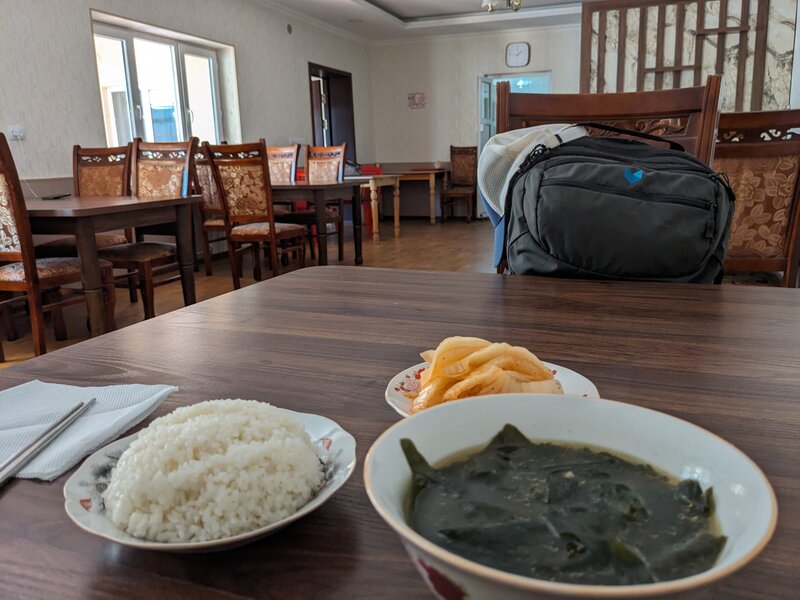
Uzbek ajummas in the Koryo-Saram restaurant spoke their regional Korean fluently.
At this point, all my electronic devices were basically out of power because there was no power outlet on the night train from Bukhara. My portable battery was also out of juice because I had that moral impulse to share it with a fellow passenger on the train. I sat around after finishing my meal to let all my devices charge up. With a full day and night ahead until my Baku flight, I needed my devices up and running. After an hour, they were somewhat charged up and I started preparing to go out. It was my last day in Tashkent, and I wanted to explore more of Koryo-Saram heritage while there was still daylight. I knew that the autumn sun would disappear in no time and the temperature would drop rapidly.
I asked the Uzbek ajummas what else they recommended I check out in Kim Pen Khva Kolkhoz. They replied that there was really nothing much to do there. According to them, the village was just too small, and I would be better off visiting some other villages if I wanted to see something interesting. They debated at length in Uzbek where I should go next, and I just sat around and fidgeted with my phone. “Politatel edo Koryoin-i mani sarayo,” (“Many Koryo-Saram also live in Politatel”) one of the ajummas finally told me in Korean. I became a little confused because none of the maps said anything about a place called “Politatel.” They were confused as well. All they remembered was that there was a big Korean restaurant and that it might have been in Politatel. The young man who happened to be around joined the search for this mysterious place.
After some lively debate, they reached a conclusion and pointed to a place called “Dustlik” on the map, telling me that it was the place I should visit next. Politatel and Dustlik were apparently the same place. Dustlik was rather far from where we were, and the ajummas said that I had better take a cab if I was serious about going there that day. “Teaksi han 60,000 sum jeongdo ilgondae, guenchanayo?” (“Taxi would be around 60,000 sum–$4.6–. Would you be okay?”) I said it was fine, and the ajumma called for a cab driver.
I was curious about what Politatel would be like. It was supposed to be a bigger town and have more Koryo-Saram residents than Kim Pen Khva Kolkhoz. But something kept nagging at me–the more I thought about going there, the more it didn’t make sense to take a cab. Taking a cab there would surely save me some time, and I was actually kind of short on time as it was already three o’clock. But it just sounded too easy to take a cab straight there. I told the ajummas that I would rather go back to Qu’yliq and figure out public transport. So the ajumma had to call the cab driver again and tell him not to come. The cab driver got pretty mad, and I could hear him angrily arguing over the phone. My bizarre predilection for doing it the hard way was making things harder for the good-hearted people who were trying to help. I apologized to the ajummas, but they laughed it off and said it was nothing.
The ajummas told me that I would be able to get back to Qu’yliq on a Damas taxi and asked the young man to accompany me to the nearby spot where Damas would be. I packed up my stuff and walked toward the door while saying goodbye to the Uzbek ajummas. One of them looked kind of worried and said, “Mom josimhaseyo” (“Take care of yourself”). “Yeogineun isanghan aedueli manko,” she went on, “hangukcheorum gurochiga-annayo” (“There are many bad people here, it’s not like Korea”). Maybe she was right and there really were bandits in the seedy alleys of Tashkent out to exploit me. Or maybe that wasn’t quite true. But whether she was right or wrong didn’t seem important to me at that time. The sun was still out, my devices were juiced up, and my belly was full. Everything was ripe for a trip to this mysterious village of Politatel, and nothing could have been enough to dampen my adventurous mood.
I bowed to the ajummas and thanked them, “Geurom gabogasseumnida” (“I’ll be on my way”). The young man and I walked down the main street for a bit, until we saw a bunch of white Damas parked on empty ground. Some drivers who were loitering recognized the young man and greeted him with smiles and handshakes. The young man explained my situation to the drivers and went on his way after having a brief chat with them. The Damas were empty and there were no signs of passengers. I told the drivers that I was going for a walk around the village and would come back. They jokingly warned me that they wouldn’t wait for me if I took too long.
The main street led to the edge of the village where I saw a vast field stretching into the distance. Nothing much was going on there. No one was really around, and the crops had already been harvested. There was an emptiness. The lazy autumn sun, now well past its zenith, was beaming all over it from the shoulder of the blue sky. I stared at the field from an abandoned Soviet bus station across the road. Some lonely bird glided over the empty field in a daringly low flight. Everything looked so peaceful, and particularly under the glaring sun, the field had a lazy and rustic atmosphere. But somehow I was beginning to catch a glimpse of something that wasn’t there.
What lay before me was probably the very land on which Kim Pen Khva discovered the motherland reborn. Displaced from their own home and exiled to a world unknown, Koryo-Saram must have had nothing left, except for this quiet patch of land, to rise from their destitute and tragic circumstances. Under the roof of that derelict bus station, staring into the field, suddenly I began to see their struggles a bit more clearly. The cool breeze on that empty field whispered stories that the black-and-white pictures or curated explanations, for all their erudition, couldn’t convey. It was Koryo-Saram’s sweat that, drop by drop, transformed this once arid soil into fertile farmland. But all that remained today was silence. A white Zhiguli made a sharp turn and drove past me, breaking the quiet.
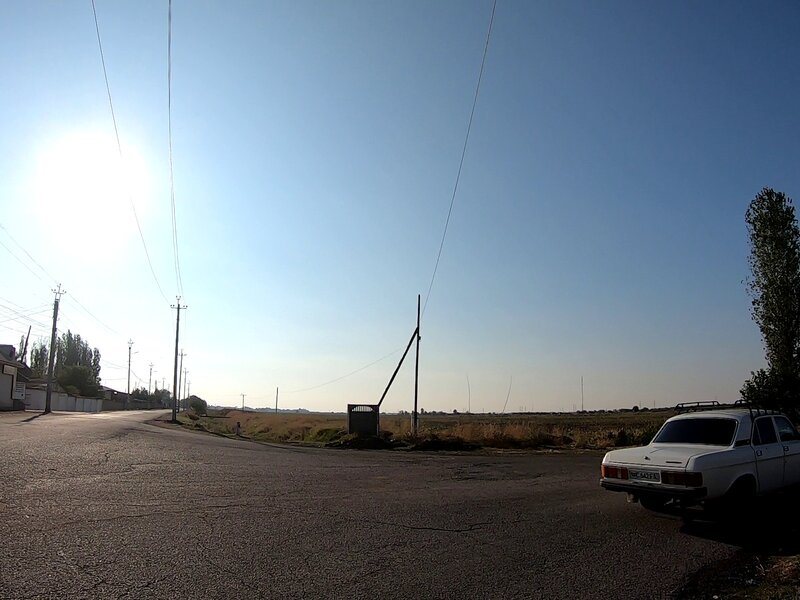
The vast field stretching into the distance was empty and there was no reminder to tell Koryo-Saram’s stories.
There was nothing more to see or do in the village, just like the Uzbek ajummas had told me before. I slowly walked back toward the Damas. All the Damas taxis were still there, and since my absence, only one more passenger had shown up. I didn’t know how long it would be until we could depart. As the time rapidly approached 4:00PM, I began to wonder whether I should have let the ajummas call me a cab after all. But I had already waited for a while, so I decided to wait it out a little longer. This irrational decision at least led to some interesting new encounters. There was a group of four or five village residents chilling and chatting across the street. I walked over to them and introduced myself. We were able to communicate in Russian, but their conversation was entirely in Uzbek. The village residents were pretty amused by my sudden and random presence and welcomed me. So I gladly became a third wheel in their lively discussion, laughing at jokes I didn’t understand, and answering with a smile questions that made no sense. A few more people joined our little circle, and the new arrivals greeted everyone by going around and shaking hands. “Assalomu alaykum,” they would greet me in Uzbek with a handshake and would place their hand on their chest with a slight bow. “Privet,” (“Hello”) I replied in Russian and did the same with my hand.
After around half an hour, we finally had enough passengers for the Damas to depart. Some of us said goodbye to the rest of the group and started walking toward the vehicle. Loaded with passengers, the mighty Damas drove through the bumpy main road of Kim Pen Khva Kolkhoz, past the large stone gate that said “KIM PEN XVA,” past the empty and silent fields, past the abandoned shops and the “Dom prodayotsya” (“house for sale”) signs, and eventually left the village behind. We rode in silence through the heavy traffic bound for Tashkent. When we finally got to Qu’yliq, the sunlight was already sort of taking on an orange hue. I paid the driver and got off onto the busy streets of Qu’yliq.
Although I still had so much time until the red-eye flight to Azerbaijan, I could sense that there was only so much sunlight left. I couldn’t just walk around and explore the late-afternoon Qu’yliq. I stopped a random passerby and said, “Ya khochu poyekhat v Dustlik,” (“I want to go to Dustlik”) and asked, “a marshrutka yest?” (“Is there a marshrutka?”) The man tried to explain something to me, but I couldn’t really follow. When I told him that I didn’t understand, he walked with me to a nearby street where a bunch of marshrutkas were stopping and stood with me for a while until the right one arrived. The man went up to the driver, exchanged some words, and told me to get on the vehicle. I thanked him and jumped on the back seat of the marshrutka, along with some other passengers who had also been waiting. The passengers each passed 5,000 sum ($0.40) to the driver for the fare, and I followed.
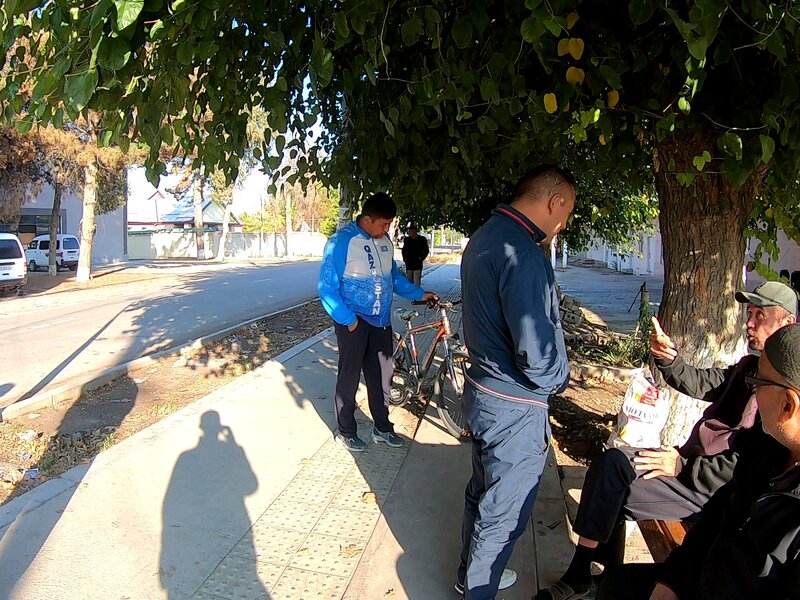
The village residents at Kim Pen Khva Kolkhoz were rather amused by my random presence in their circle.
The packed marshrutka rode down the busy streets, now fully painted in the orange color of the evening sun. The back corner where I was sitting had no window, and I could hardly tell where we were even going. It was also hard to see out the windows on the opposite side because they were flooded with the bright orange sunlight. I asked the babushka who was sitting beside me whether we were going to Politatel. She smiled and replied that the marshrutka would stop at Politatel. Since she seemed to know where Politatel was, I asked her whether it was true that many Koreans lived in Politatel. The babushka said, “Da, mnogo Koreichev tam zhivut” (“Yes, many Koreans live there”). Several other curious babushkas joined in the conversation and confirmed that Koreans lived in Politatel. I told the babushkas that I was a Korean and I wanted to meet and talk to Koryo-Saram. The babushkas laughed and said that they would let me know when we got there. The marshrutka continued to drive down the busy streets in silence, as the tired passengers looked bored or were dozing off, their heads nodding to the rhythm of the road beneath.
I passed the time looking out the back window of the marshrutka to sneak a peek into the busy streets on which we were riding and observing random things to amuse myself. For example, some streets clearly had three or four lanes of traffic, but didn’t have any lane marks. The traffic flowed just fine in spite of that. The scenery gradually changed–The medium-rise apartment buildings became fewer and farther between, and the traffic grew thinner. After a certain point, there were mostly just open fields and small houses. Just when I was beginning to get used to the new scenery, the babushkas started telling me that we were near Politatel. The vehicle slowed down and pulled over to the side of the road. At first, I wasn’t sure how I was going to get through all the passengers since I was all the way at the back and was the first passenger to get off the marshrutka. But somehow I managed to carry my oversized backpack through everyone and step onto the street.
With the help of the Uzbek babushkas, I finally got to the mysterious town of Politatel, or Dustlik as it was shown on the maps. The first impression I had of Dustlik was that it was definitely larger than the Kim Pen Khva Kolkhoz. The main road going through the town was larger and even had traffic lights for pedestrians and cars. Looking at the semi-busy streets of Dustlik, I realized that I had zero knowledge about the place. I randomly got to this town which, merely an hour ago, I didn’t even know existed. What was I to do now? Should I go around and ask where I could meet Koryo-Saram or see Koryo-Saram things? That sounded sort of silly at first, but actually wasn’t that bad an idea.
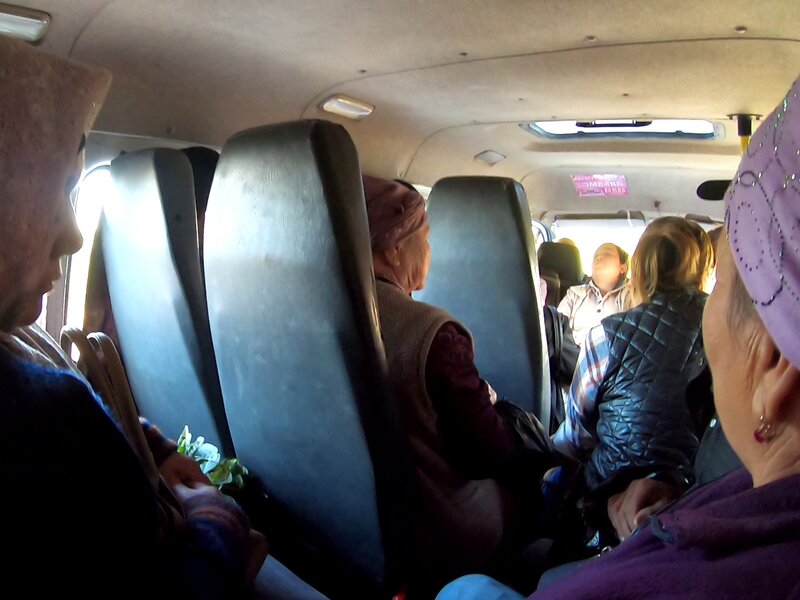
With the help of curious babushkas on the marshrutka, I managed to find my way to the mysterious Politatel.
Before anything, I wanted to convince myself that I was in the right town. Finding the restaurant that Uzbek ajummas from the Kim Pen Khva Kolkhoz were talking about sounded like a good start. And I didn’t have to look hard, because it was right there near the entrance to the town, a two-story brick building with a big sign. I approached the building in the hope of finding someone that could tell me more about Politatel. There was a babushka sweeping the front yard, and I went over and said hello. She was an Uzbek babushka who worked at the restaurant. She said the managers of the restaurant were Koryo-Saram, but they weren’t around at the time. She also said that Koryo-Saram indeed lived in the area.
“Khochesh pokushat?” (“Do you want to eat?”) the babushka asked, thinking that I was looking for a restaurant. But I had no time to sit down and relax. The twilight made it clear that daylight was almost running out, and I probably had an hour left at most before things would close down. I told her that I didn’t want to eat right then and instead asked whether she could recommend anything to do in the town for a Korean visitor. “Tam vidite, priyamo po doroge,” (“You see, straight down the road”) she pointed down the main road and said some things really quickly. I couldn’t make out everything she said, but at the end, caught a phrase, “I tam muzey” (“And there is a museum”).
A local man was walking out of the restaurant and heard our conversation. He said, “Musei, da? Gdye on ya pokazhu” (“Museum, right? I’ll show you where it is”). I thanked the babushka and followed him to the main road. His name was Sador. “Eta takoi musei, eta Koreyskiy ili?” (“What museum is that? Is it Korean or?”) I asked. “Kareiskyi,” (“It’s a Korean museum,”) Sador replied, “Hwang Man Gyma” (“about Hwang Man-Geum”). That last word didn’t sound like Russian or Uzbek. With the way he said it, I was pretty sure that it was a Korean name with a surname “Hwang.” To be sure whether I heard it right, I pulled out a map to check what was going on. I couldn’t see any Korean names at first, but when I zoomed in closely, the map did say that I was in “Hwang Man-Geum.” It was confusing.
“A Yandex Karti,” (“And Yandex Map,”) I began to ask in fractured sentences, “Hwang Man-Geum, shto eta?” (“Hwang Man-Geum, what is that?”). “Zdes’ Hwang Man-Geum, eta Koreyskiy” (“This town is Hwang Man-Geum, that’s in Korean.”), Sador explained. “Politatel byl, Dustlik seychas, na uzbekski Dustlik,” (“It used to be Politatel, and now it’s Dustlik, that’s in Uzbek”). Sador continued, “I eta Hwang Man-Geum,” (“And it’s also called Hwang Man-Geum”) articulating that last name again in a distinct Korean pronunciation. It all made sense now. The obscure “Politatel” that I heard but could never find on the map was the old Russian name used during the time of the Soviet Union. Today the area was known as Dustlik in Uzbek and also Hwang Man-Geum in Korean. Hwang Man-Geum must have been a kolkhoz chairman just like Kim Byeong Hwa. So it turned out that this town was also named after a Korean person, just as Kim Pen Khva Kolkhoz was.
In the meantime, Sador dialed the owner of the museum to see whether it was open, but no one answered the phone. So he kept trying some other numbers, and the voices on the phone said that museum was probably not open at that time. Meanwhile, another local resident spotted us on the main road and came over with a friendly greeting. Sador told him that I was a tourist, and I began to explain to the resident what brought me there, “Ya prosto khotel posmotret zdes’” (“I just wanted to check out this place”). And I briefly added “No, musei zakryivali, ya dumayu,” (“But I think the museum is closed”) hoping that the man might have some insider information about the museum.
“Net seychas, okhrannika net,” (“It’s not open now, the guard left”) the man replied with an apologetic expression on his face, shaking his head. “A gdye mozhno obscaemcya c koreiskyi lyudi?” (“Where can I talk with Koreans?”) I asked in ungrammatical Russian. I figured that, if the museum was closed, it was closed, but I wanted to still talk to some Koryo-Saram. The man somehow understood what I was trying to ask. “S mestnymi koreytsami poobshchat’sya?” (“Wanna have a chat with local Koreans?”) “Da, da, poznokomit’sya,” (“Yes, yes, I want to meet them”) I abruptly added. The man said that the manager of the Korean restaurant was Koryo-Saram but wasn’t too sure where else I could meet a Koryo-Saram.
I thanked Sador and his acquaintance and started walking toward the museum. I didn’t know what I was expecting. A part of me hoped that the museum would be magically open somehow. But I probably just wanted to get to the museum for the sake of it because I was already in town. The museum wasn’t far. Near the center of the town, I could see a small building with a simple sign that said “MUZEY” in Uzbek. The sign was burning brightly in the orange color of the setting sun. It had a large overgrown garden, and some fountains that were turned off. Decorative metal fences surrounded its humble domain. Unable to get past the fences, I stopped on the side of a busy road to take a look at the museum. The distance that separated us felt like an uncrossable chasm that lay between Koryo-Saram and myself. I yearned to catch a glimpse of the story of Hwang Man-Geum and of Koryo-Saram in this area, but there were no reminders of that. Only the impervious brick walls of the museum blankly stared back at me. That impassable separation and the sinking sun made me feel rather helpless.
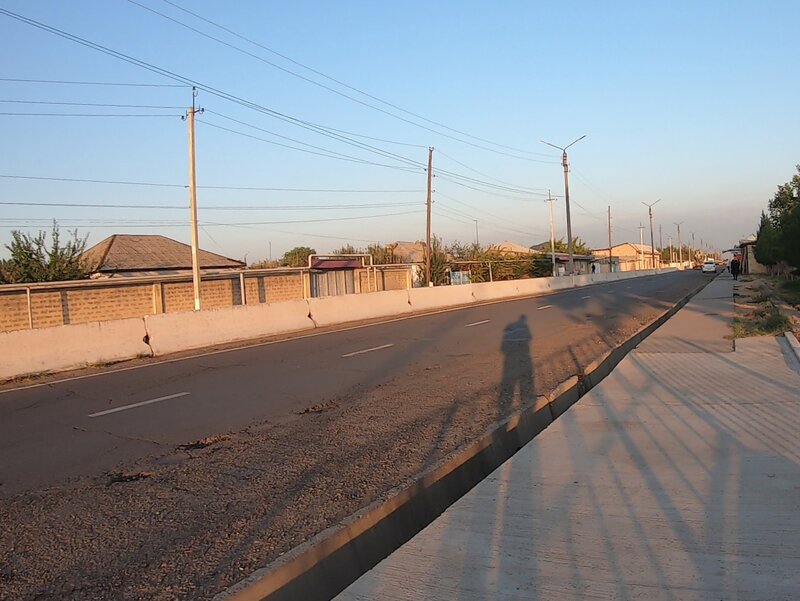
My footsteps were heavy as I walked away from the impassable divide of the museum walls.
My footsteps were heavy as I reluctantly walked away without any particular direction in mind. The backpack straps were pushing me down harder than usual. Not far from the museum, there was a babushka sweeping the street. Hoping that she might know something about the museum, I walked up to her to introduce myself. “Ya turist iz Korei,” (“I’m a Korean tourist,”) I said and continued to ask, “Vy znaete li musei rabotaet segodnya?” (“Do you know if the museum is open today?”) She just replied, “Musei seychas zakrito navernoe” (“Museum is probably closed now”). I tried to ask when it was supposed to open in the morning, but she didn’t have any more information. Sensing my disappointment, the babushka smiled and said “Kak pozdno, konechno,” (“I mean, it’s kind of late”) in an attempt to console me with an explanation. “A otkuda? S Korei priyehal ili kak?” (“And where are you from? Did you come from Korea?”) the babushka asked. “Da, ya… iz Korei…” (“Yes, I’m… from Korea…”) I trailed off. Growing up as a third culture kid, I never really knew the right answer to the question. But at the moment, exploring the distant history of my compatriots in a remote village, I felt that I was from Korea, whatever that meant.
The babushka smiled at my answer and again somewhat apologetically said that she couldn’t say much about when the museum might be open. Suddenly a thought crossed my mind that maybe she knew where I could meet Koryo-Saram. I again asked with my broken Russian, “Ya prosta khotel obschaem’sya kareichev zdes’” (“I want to communicate Korean here”). I never really could figure out how to say that in a grammatically correct way, but the babushka understood out what I meant. She asked back, “S kareichami obschat’sya, ili kak?” (“Do you mean you wanna speak with Koreans?”) I nodded and said, “Da, gdye mozhno?” (“Yes, where can I?”) “Ahh.. vnuk mozhet byt, u menya vnuk tam,” (“Ahh… Maybe my grandson, he’s here,”) she said, walking back to her house. At that time, I actually didn’t know what “vnuk” meant, but could figure out from the context that she was going to get someone. “A tebe skol’ko lyet?” (“And how old are you?”) the babushka stopped and asked. As I was pausing for a bit to remember how to count in Russian, suddenly she changed into Korean and asked, “Myeossaria?” (“How old are you?”) Shocked, I replied to her in Korean, and she understood perfectly. It turned out that, unknowingly, I had already met a Koryo-Saram in Dustlik.
Soon a young man appeared from a house nearby and greeted me. His name was Viktor, and he was nice about a stranger’s blunt request to get acquainted. I asked Viktor what the nearby museum was about. By this time, I had already accepted the fact that I wouldn’t be able to visit the Hwang Man-Geum museum before leaving for the Caucasus. But I still wanted to know what was inside those formidable brick walls. Viktor said it was about the history of how the ethnic Koreans who moved here during the 1940s established themselves in the region. When I asked about the Koryo-Saram population in the area, he told me that maybe Koryo-Saram made up twenty percent of the town’s population. He added that many young Koryo-Saram had already left the region to go and work in South Korea. I naively asked why, and Viktor explained that there were more opportunities in South Korea and that the wage was also higher. We spoke mostly in Russian, but noticing my limited command in the language, Viktor mixed some English into his sentences to help me understand better. “Sorry, my English is bad,” he apologized with a smile and a heavy Russian accent.
While we were on the subject of the dwindling Koryo-Saram population in the town, I became curious about one thing. Did Viktor also want to leave Dustlik and try to live in South Korea? As much as I wanted to find out, I wasn’t quite sure how to broach the question. It was a rather delicate thing to ask. I feared sounding like I was dangling a prospect of higher income or better opportunities directly to Koryo-Saram, when I was utterly ignorant about what their values were. But I asked away, hoping that my innocent curiosity wouldn’t get lost in translation and unintentionally take on a more condescending tone.
“A vy tozhe khotite tam… uh… itti?” (“And do you also want to… uh… go there?”) I stumbled over words as I tried unsuccessfully to navigate the linguistic minefield with my very limited vocabulary. Viktor answered that he had actually traveled to South Korea a number of times and told me about all the cities that he had been to. He had visited more places in South Korea than I had. But that wasn’t what I wanted to ask, and I decided to be more direct. “Vy khotite rabotat’ tam? Ne kak turist” (“Do you want to work there? I mean not as a tourist”). Now the direct ball had been thrown and was out of my hands. Viktor thought about it for a second and answered me. “Ya khotel by zdes’ porabotat’,” (“I would like to work here”) he said, “I zdes’ razvivat’sya” (“and develop here”). “Prosta mnogiye uyezzhayut. A zdes’ moya, grubo govorya, rodina. Zdes’ moya babushka. Khotelos’ by zhit’ zdes’ luchshe, chem v Koreye” (“It’s just that many are leaving. But this is, roughly speaking, my motherland, like, my grandma’s here. I would like to live here more than I want to live in Korea”). I could hear a certain conviction in Viktor’s reply. “U kogo net vykhoda, a u kogo net vozmozhnostei, oni uyezhayut tuda, rabotat’ v Koreye” (“Those who had no way forward, or no opportunities here, already went to Korea to work”), was how he ended his explanation. “Khorosho…” (“I see…”) I mumbled into the quiet.
As we tried to disentangle such a heavy subject, its seriousness started weighing down on the atmosphere around us. Feeling a subtle and unexplainable tension in the air, we mutually and quickly switched to a more lighthearted topic. Viktor said that I might have been just a tad bit late for the museum and recommended that I come back in the early afternoon. I told him that, unfortunately, I was leaving for Azerbaijan that night and wouldn’t have a chance to come back the next day. Viktor seemed interested in the fact that I was traveling alone in this part of the world. So we talked about that briefly. I didn’t get into the whole story about trying to reach Dublin from Beijing, but managed to tell him that I was moving to the US, and that he should drop me a line if he ever visited. After some small talk, we said goodbye and Viktor disappeared back into the house.
I started roaming the main road of Dustlik once again, not exactly heading anywhere in particular. The town at sundown was lonely. Some Damas and marshrutkas rushed past me with a beep. The air was becoming colder and the sunlight scarcer. Contrary to what the ajummas had said, Dustlik didn’t seem to have any bigger Koryo-Saram presence than Kim Pen Khva Kolkhoz. Local residents didn’t really care about this scrappy drifter and just went about their business. Only some school children on their way back home stared curiously for a second and moved on. I still wanted to meet more Koryo-Saram who remained in the village and hear their stories. But it was unclear where I could meet them.
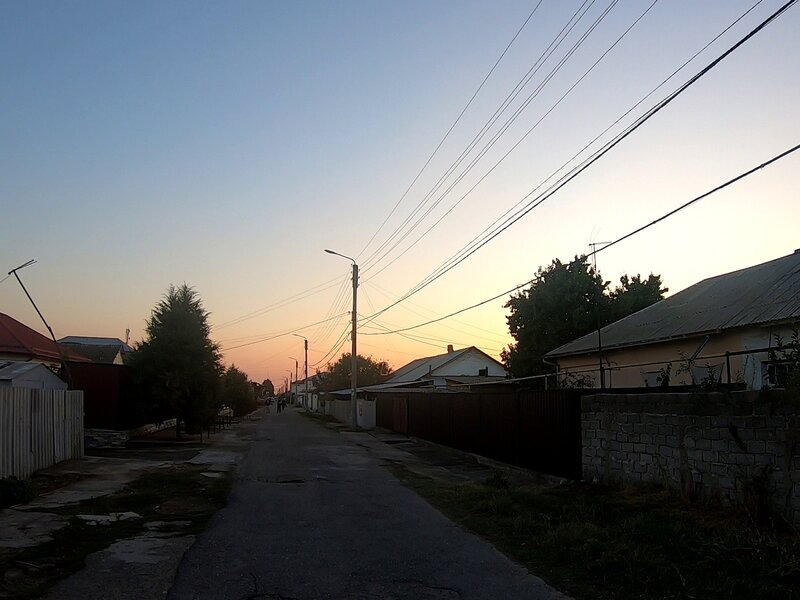
The local residents were uninterested in this scrappy backpacker drifting aimlessly, looking for any piece of Koryo-Saram history.
I took a turn into a minor street with a semi-paved road surrounded by aging houses. All the doors were closed and there wasn’t much activity on the street. Only the bright orange sunset was making its last, helpless stand before being swallowed inevitably by the horizon. There were two elderly town residents walking in the opposite direction. I introduced myself as a tourist and asked them where I could meet Koreans in the area. The two men seemed interested in the fact that I was a tourist and said that the town had Koreans. They pointed to the end of the road where there was an intersection and said, “Vot sichaz, v tsentr proidyeosh” (“Here, go to the center over there”). “Tsentr?” (“The center?”) “Da, i v tsentre na levoy storone tam kafe i tuda-syuda tam keoryskiye mnogo” (“Yes, and on the left side, there will be a cafe and some Koreans there”). The elders then asked me, “Otkuda? Iz kakoy Korei? Yuzhnoy, Severnoy?” (“Where are you from? Which Korea? South or North?”) When I told them I was from South Korea, they joked about how different the South and North Korea were.
They said that there were lots of Koreans here before, but they have left recently. “Tuda idi, do koncha” (“Walk toward the end of the street”), the elders said and started walking away. But I wanted to ask more. They must have had some interesting insights, having lived through the times of the Soviet Union. I asked them what happened to the Koreans, and the elders gladly took me down the memory lane. “Ran’she byla, zdes’, Koreyskiy kolkhoz byl, vo vremya sovetskoy vlasti” (“There were many in the past. There was a Korean collective farm during Soviet Union times”). One of them said something about “Hwang” and the other one continued, “On geroy sotsialisticheskovo truda, Hwang” (“He was awarded the Hero of Socialist Labor”). Their vivid account of the heyday of the collective farm was in a stark contrast to the crumbling houses and overgrown backyards around us.
When the elders went on their way, I walked in the direction they were pointing and reached the center of town where some administrative buildings and small shops stood. But I wasn’t sure where to go next. There was no trace of Koryo-Saram. Some locals were walking home or getting into cars and didn’t seem to notice the tourist that appeared from nowhere. One by one, the lights and neon signs of the small shops came on, and the color of the sunset faded away in the cloudless sky. I stopped some local residents on the streets or even walked into some shops to inquire where I could meet Koryo-Saram, but they couldn’t really help.
Just when I was about to give up hope, a woman told me to follow her and led me to a nearby shop. Inside the small shop, a Koryo-Saram shopkeeper was sitting at a desk. I awkwardly introduced myself as a Korean tourist and that I wanted to meet the Korean residents of Dustlik. She asked whether I had already been to the Hwang Man-Geum Museum. When I told her that it was closed, and that unfortunately I wouldn’t be able to come back for it because I was leaving for Azerbaijan, she dialed some numbers. She talked rather seriously on a phone, explaining that my situation. When she hung up, she told me that she had just spoken to the owner and we just needed to wait a bit to see what the owner could do.
“Nu, tak vot po gorodam yedite i smotrite, da?” (“And so you are going around the town and having a look?”) she asked in Russian. I told her that I had only seen a small part of the town because it was kind of bigger than I thought. I proceeded to ask, “Ya slychal chto ran’she byla ochen mnogi Koreytsev, no sichaz net, da?” (“I heard that there were many Koreans here before, but not anymore right?”) “Sichaz, net,” she answered, “seychas v osnovnom vse musul’mane, da?” (“Nowadays, the population is mostly Muslims”) “Da”, I said, “dumayu da” (“Yes, I think so”). “Potomu chto vse koreytsy uyekhali, kto kuda” (“Because all Koreans left, each to their own place”). “A kuda oni ideyom?” (“Where they go?”) I asked, in broken Russian. “V yuzhnyu Koreyu vse v osnovnom edyt, tam rabotayut,” (“Mostly they went to South Korea,”) she said, “zdes’ dama prodayut, i tam pokupayut” (“Selling homes here and buying a place there”).
I wanted to ask the same question that I posed Viktor. What was the story of Koryo-Saram who remained here, in spite of many of their neighbors leaving? “A vy tozhe khotite rabotat’ v Koreye?” (“Do you also want to work there?”) “Nyet,” she smiled and shook her head slightly, “mne tam ne nravitsya. Ya tuda yezdila” (“I don’t like it there too much. I’ve been there”). “Yezdili?” (“You were there?”) “Da, yezdila ya, no,” (“Yes, I was there but,”) she looked out the window for a second and continued, “ya zdes’ khochu. Moy dom zdes’” (“I want to live here. My home is here”). Soon, a customer walked in and our conversation came to an end. When the customer left, her phone rang and she spoke with someone for a bit. It was not a good news–the museum owner wouldn’t be available that evening as it was already too late. I thanked her, made some small talk, and eventually left the shop.
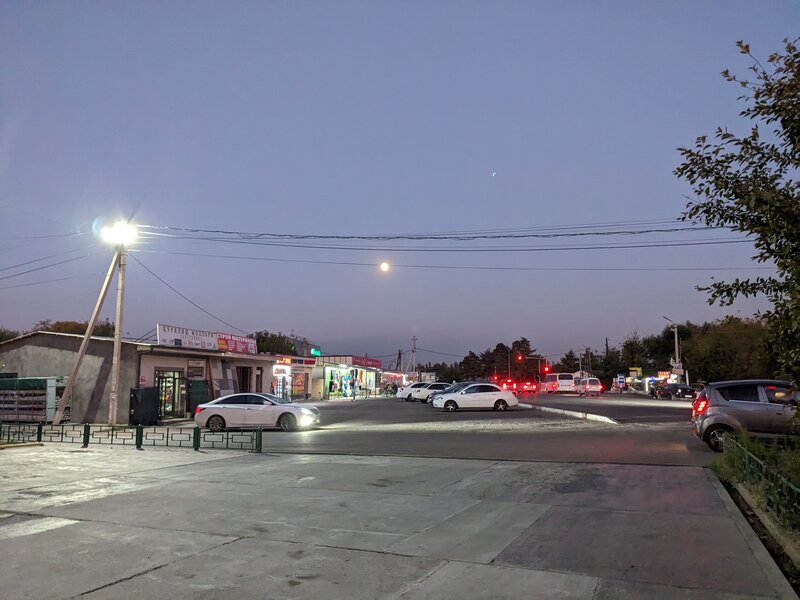
The dusk had fallen all over the streets of Dustlik, and the night air was soaked with cold moonlight.
When I got to the streets, dusk had settled over everything. The night air, soaked with cold moonlight, spilled into my bones and sent shivering chills down my spine. Since it was too cold to stay still, I started walking around the dark and empty streets of Dustlik for the last time. The potholes on the crumbling pavement were now filled with darkness, and the old houses with abandoned backyards kept their silence. All the surroundings felt so foreign, and I couldn’t shake off the feeling of being somewhat estranged from everything around me. Where was I? I had traveled today looking for a Koryo-Saram town, but I wasn’t too sure that I really had found one. The characters and languages that I encountered on the streets today were a bit too distant from what I naively imagined that I might find in a Koryo-Saram town. Grasping for some familiarity, I walked into the Koryo-Saram restaurant on the edge of the town. A Koryo-Saram dinner felt like a fitting way to end my trip in Tashkent. But there were no Koryo-Saram in the restaurant. No amount of Korean cuisine on the menu was enough to bridge the gap between reality and my naive expectations. Disillusioned, I left the restaurant without sitting down and ventured into the cold night once more.
In the distance, the Hwang Man-Geum Museum was now shrouded in the colors of the gathering night and was barely visible. I asked myself what I had seen that day. More than the lives of Koryo-Saram, I saw an emptiness that belied their rich and long history in the region. The dark streets of Dustlik were now brimming with the stories left untold. Their weight was unbearable and I was desperate for someone to tell me how those stories went and what they all meant. The silence was only broken by the indifferent noises of the cars merely passing by. But gradually I began to understand that the emptiness I saw or the silence I heard was perhaps no reason for disappointment, for it simply meant that some Koryo-Saram had found their own places elsewhere in the world. Wherever they were, they would have discovered their motherland reborn just as their forefathers once did. Those who found new homes must have seized the opportunities they felt that their own environment couldn’t provide. Just as I set out to follow my imaginary roads to an unknown life in Seattle, they too would have followed the roads toward their lights. Just as I was now writing my stories of an absurd trip from Beijing to Dublin, they too would be writing their own unique stories wherever they were. Who was I to say that the silence was tragic? I heard a chime of hope buried in the hum of the night streets.
As the night deepened, the temperature dropped. It was becoming yet again clear that my worn-out jacket was no match for the cold autumn nights of Central Asia. I wondered how much colder it would be in the Caucasus and whether I should just bite the bullet and buy a warmer jacket. The fear of getting ill once again crept up in my mind, as I was still kind of under the weather since the last week’s Irkeshtam Pass crossing. I decided to go back to Tashkent to escape the cold and pass some time until the red-eye flight to Baku. I didn’t know where exactly I could go. I just sat down in what looked to be a bus stop to wait for a bus that would take me back to the city.